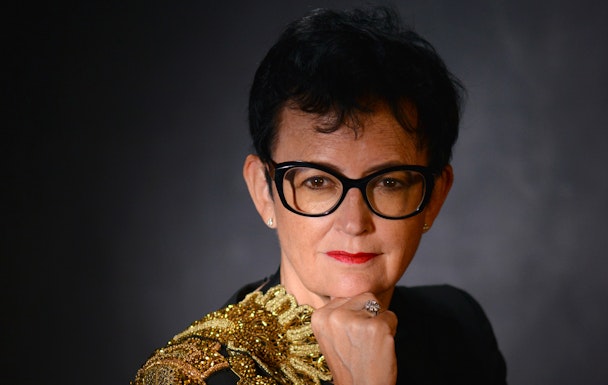‘I felt like an unlikely candidate’: getting to know Ogilvy’s Patou Nuytemans
Patou Nuytemans has been Ogilvy’s EMEA chief executive for 18 months. The Drum caught up with her to learn more about her tenure so far, about the ‘imposter syndrome’ she experienced taking the job and how she’s pivoting the agency’s public image.

Ogilvy's Patou Nuytemans on her varied career; imposter syndrome; and why Ogilvy is more than an ad agency / Credit: Ogilvy
Belgian-born Patou Nuytemans took over as EMEA chief executive at Ogilvy when longstanding incumbent Paul O’Donnell transitioned to chairman in 2021. Her own career with the storied agency goes back three decades, starting with an internship at (now defunct) direct marketing arm OgilvyOne, followed by a string of leadership roles.
The Drum sat down with Nuytemans to take account of a one-agency career that’s spanned “six homes on three continents”, her self-assessment of 18 months at the helm and the management philosophy she’s subtly dispersing.
Hi, Patou. What exactly does a regional CEO do for Ogilvy?
Ogilvy is organized across five regions around the world and I run one of them. We work across five businesses – advertising, experience, health, consulting and PR and influence – so I look after those five businesses and I support their collaboration across EMEA, which is about 30 consolidated markets and 25 more equities and affiliates.
We are a team that collaborates globally. We have a global strategy and a small global leadership team, but the regions operationally run our business, supported by our market leads.
It’s a very matrixed organization, but I think we’re good at it. Being a highly collaborative organization that doesn’t need a linear, hierarchical structure to make things work is something that we’re very familiar with. It’s one of our key strengths.
Advertisement
I suppose if anyone knows the organization inside-out, it’s you.
It feels like a dirty word, but I grew up through this organization. It’s not a popular move, now, to stay with a company for a very long time. But I feel fortunate. I haven’t ever become ‘part of the furniture’. I’ve had very different roles across six homes on three continents. Ogilvy is a strong brand with a consistent employee experience wherever you are, but it’s been very different in terms of what each job entailed. I started as a commercial engineer in Belgium who didn’t have any idea what advertising was about.
How did you get started, then?
I took a marketing course, but I had no idea what agencies were about. For an internship during my master’s, I landed in the agency world – on day one, whoever introduced me said, ’here are the account people’ and I thought they were accountants.
After the internship, they asked me to stay on [at OgilvyOne] as an account manager. It was a small office, so I was also doing strategy and involved in new business. From early on, I got a taste of the different agency disciplines.
From there, I left to join my client briefly – I suppose I felt I’d got a piece of the pie, but I hadn’t seen the full pie. I joined Microsoft in its heyday for two and a half years. I missed agency life and I missed being surrounded by people who cared about my trade, but the advantage of seeing client-side is that you really see end-to-end.
When you returned to Ogilvy, you started on a varied string of jobs.
I went to Paris where I led the IBM account. From there, I went to New York, working on Ogilvy’s knowledge-sharing platform. I think I was one of the first global knowledge managers. It was an amazing adventure and I got to know all aspects of our network. When I came back to Europe, that’s when we started to really drive our digital agenda and get it out of the corner as a capability across all our businesses. Later, I was also one of the first chief digital officers.
How valuable is that breadth of experience to you now?
I assume it’s what got me the job. I did feel like the unlikely candidate – typical impostor syndrome: I’m Belgian, not American, not English. I asked, ’are you sure?’ but [WPP boss] Mark Read said, ’that’s nonsense, that’s not who we are in any shape and form’. Of course, it was all driven by my own perceptions of what’s in the books for somebody with my nationality and experience.
Having lived in many different countries, I hope I understand what’s common, but also what’s different. Understanding the breadth and depth of what we do and how to bring it together is the essence of my strategy in this role. At Ogilvy, we talk about ‘borderless creativity’. That’s often interpreted as ‘across physical borders’. But that’s not what we mean; we’re trying to say that we believe great ideas happen at the intersection of things; we innovate at the intersection of people, geographies and capabilities.
What was the transition like into this role?
I have very little experience in other industries, but I think that our industry isn’t the best at career management or succession planning. At an FMCG company or a bank, they might purposefully send people to different places and business units to drive them up the ladder. That wasn’t done for me as far as I know; it wasn’t planned. When I was asked it wasn’t a total surprise, but I was always more of a number two.
My ambition is not for titles. But I love this company, so it’s a privilege to be leading something that I’ve grown up with, with people that I care so much about. Whenever you become a CEO, there’s a sense of responsibility that comes with that. But I hope what people still recognize is that I’ve done their jobs and my key driver is to make this work through people.
How’s it going so far?
Ogilvy has had a really good year. We’ve been growing significantly, we’re winning creatively, we have some real momentum and the press is really picking up on it. We’ve landed our strategy and our differentiation, and we’re being quite clear about what our strengths are. I’m very proud of the fact that we’re getting really collaborative results. We’re not driven by one or two individual offices that are doing magnificently; it really is from South Africa through to London, Germany, Spain, Italy, Greece… we have incredible bench strength.
Advertisement
You’ve said that another priority is evolving Ogilvy’s reputation in the market. How do you do that?
Ogilvy has been a top brand for so long. It’s a brand with a real culture that people miss when they leave: it’s the collaboration that we have; its breadth and depth. We’re not just an ad agency; we all have these different things. The personal experience and the client experience are best when we see how it all comes together.
Creativity for business is what we do. Our ideas are solutions to big meaty problems that have a disproportionate impact. That’s how I describe it. I want that to be reappraised by our stakeholders, our clients, the industry at large and our people.
The strength of the brand, our belief in brands and creativity, the collaboration and the diversity we have, solving amazing, challenging client problems – that’s what I want our reputation to be about, not just ‘we’re an advertising agency’. That has to shift. We are a formidable advertising agency. But we are more than that.
For you as a leader, how do you show that from the top?
There’s a video that changed my thinking: Angela Ahrendts talking about human energy. She’s a non-executive director on the WPP board. I met her recently and had a total fangirl moment and freaked her out – that speech did something to me. But really, my job is about (maybe this makes me sound more sophisticated) being a conductor of human energy.
Ahrendts talks about how emotions play a huge role in success and in what we do. You have to be about not just the ‘what’ and the rational, but emotions; you have to be an empathic leader. I think a lot of people think that empathy is about kindness. It’s not. I think I’m a kind person, but that’s not what empathy is about. It’s about listening and being able to put yourself in somebody else’s shoes. That comes with vulnerability.
And this job – is it fun?
I love it. I really love it. But that doesn’t mean it’s easy.

